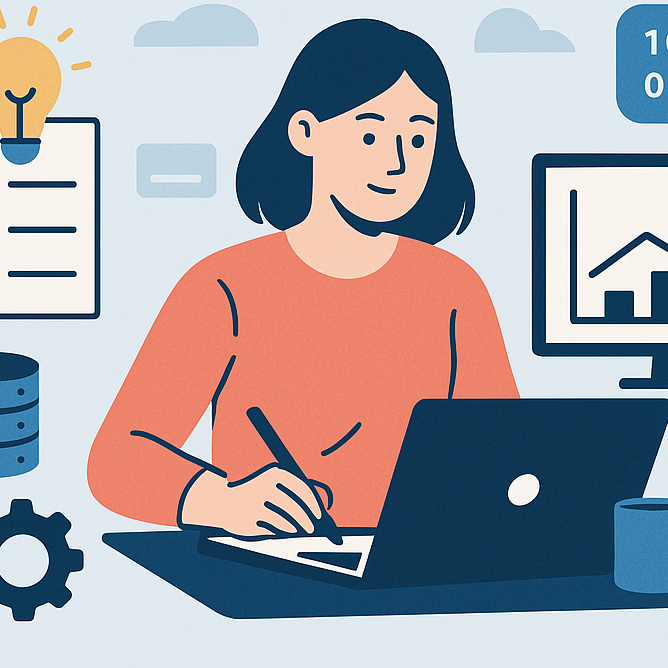Struggling with technical assessments for data roles—like coding challenges, SQL interviews, or data structure problems? You’re not alone.
Technical assessments are one of the biggest hurdles in tech and data hiring. However, they’re also your opportunity to stand out. In this article, we’ll break down a smarter, more strategic way to prepare for technical assessments for data roles, so you can boost your confidence, improve your performance, and unlock more job offers.

Why Technical Assessments Matter in Data and Tech Roles
Technical assessments are used by employers to evaluate your problem-solving skills, coding fluency, and ability to communicate complex ideas. Whether you’re applying for a data analyst, data scientist, or software engineering role, these challenges are often the first filter in the hiring pipeline.
But here’s the key: it’s not just about getting the right answer. Demonstrating your process is essential. In fact, recruiters and hiring managers care just as much about how you think through a problem and the tools. Logic is tested directly. You’ll also need to communicate clearly.
Types of Technical Assessments for Tech and Data Roles
Developers:
- Data structures and algorithms
- System design and code optimization
- Live coding via platforms like CoderPad or CodeSignal
Data Roles:
- SQL queries and joins
- Data cleaning and transformation
- Basic Python or R scripting
- Business case studies and data storytelling
Analytics & Product Roles:
- Metrics deep-dives
- A/B test analysis
- Scenario modeling and SQL-based business questions
How to Prepare for Technical Assessments in Tech and Data Careers
Forget the “grind for hours on LeetCode” myth. The most successful candidates prepare using smart, repeatable systems.
Use the Right Platforms:
- LeetCode: Best for algorithm questions and software engineering prep
- HackerRank: Great for beginners and a mix of challenges
- StrataScratch: Focused SQL questions for data roles
- Interview Query: Tailored prep for data science & analytics interviews
Create a Study Plan:
- Solve 2–3 problems a day (mix of easy, medium, hard)
- Allocate 30–60 mins per problem including review
- Track patterns and problem types that trip you up
Identify Common Coding Patterns:
- Binary Search
- Sliding Window
- Two Pointer
- Recursion and Backtracking
- SQL Window Functions & CTEs
Practice Explaining Your Thought Process
Want to really impress hiring managers? Practice solving problems out loud, just as you would in a real interview. Try this: “I’ll use a hash map here to track frequency and reduce time complexity from O(n²) to O(n).”
This not only helps you think clearly but builds muscle memory for live coding or whiteboard interviews.
Personalized Coaching = Faster Progress
When that happens, personalized coaching can make all the difference. At My Data Career Coach, we offer expert-led technical assessment prep tailored to your job targets.
- Technical Assessment Coaching: Custom mock interviews, feedback from real hiring managers, and challenge walkthroughs.
- Interview Preparation Coaching: Nail the final rounds with behavioral and technical coaching.
- SQL Interview Guide and Data Interview Prep Guide: Instant-download, high-impact resources to practice smarter.
Free vs Paid Prep: When to Invest
Start with free tools like YouTube tutorials, LeetCode, and public GitHub repos. But if you’re short on time, facing competitive roles, or getting stuck in your prep, it’s time to invest in:
- Tailored coaching with feedback
- Role-specific problem sets
- Live mock interview practice
How to Know You’re Ready
Ultimately, you’re likely interview-ready when:
- Solving medium-difficulty problems in under 30 minutes becomes routine.
- Clear explanations of your logic and trade-offs feel natural.
- You recognize problem types and patterns immediately.
Conclusion: Master Technical Assessments and Get Hired
In conclusion, technical assessments for data roles don’t have to be a source of stress.
With structured prep, the right tools, and strategic coaching, you can turn them into your advantage. Master the process, show your thinking, and land the tech job you’ve been working for.
FAQs
How many coding problems should I solve before applying to jobs?
Focus on consistency—2–3 quality problems per day is better than cramming 20 in a weekend.
Are LeetCode problems too hard for most interviews?
Most interviews use LeetCode-style questions but avoid the extremely hard ones. Focus on patterns, not just problem count.
Do I need to know system design for data roles?
Usually not, unless you’re interviewing for senior data engineer roles.
How do I avoid burnout during prep?
Rotate between easy and hard problems, take days off, and use a prep schedule to avoid overwhelm.
What’s the best way to balance job applications and assessment prep?
Block time for each. Mornings for job search, afternoons for practice. Job alerts can help you act fast.
